
RESOURCES
Help start your patients on SOLIRIS® (eculizumab)
Finding resources and support for both your practice and your patients.
For your practice
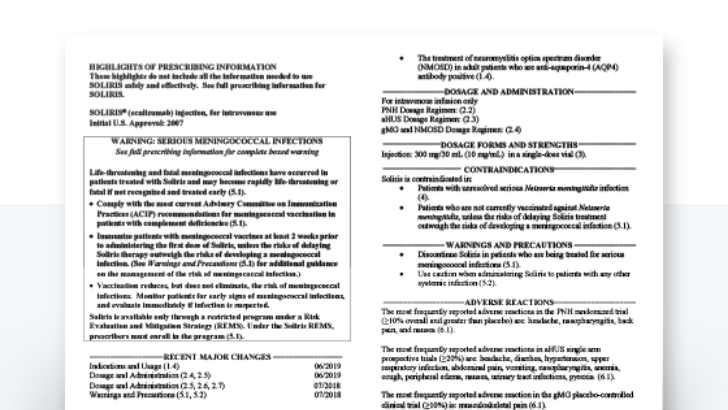
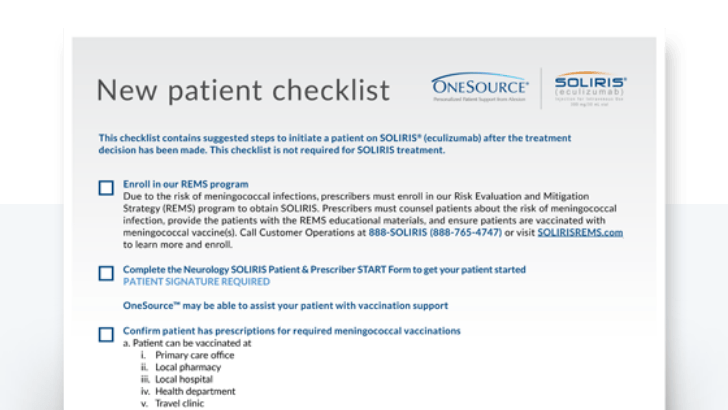
New Start Checklist
All the steps to help you and your staff get patients started on SOLIRIS sooner.
Download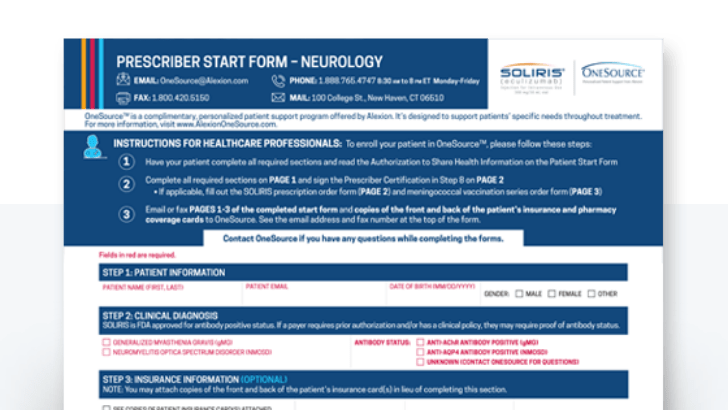
New Start Form
This enrollment form is the first step to starting patients on SOLIRIS and must be signed by the patient before being submitted.
Learn more
Vaccination Guide
The latest vaccination requirements for patients starting SOLIRIS to help prevent risk of meningococcal infections during treatment.
Download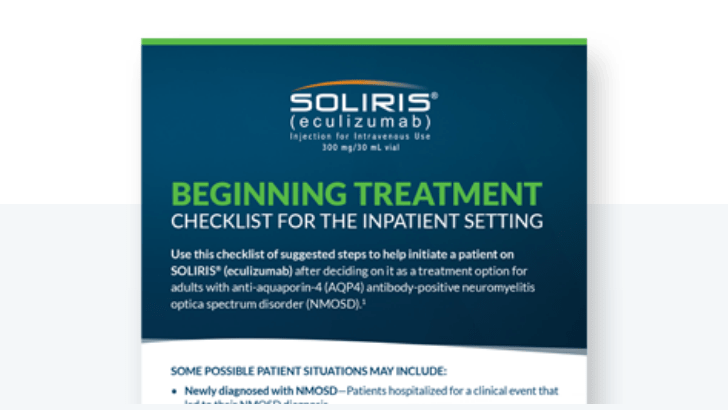
In-Patient Checklist
Use this checklist of suggested steps to help initiate a patient on SOLIRIS.
Download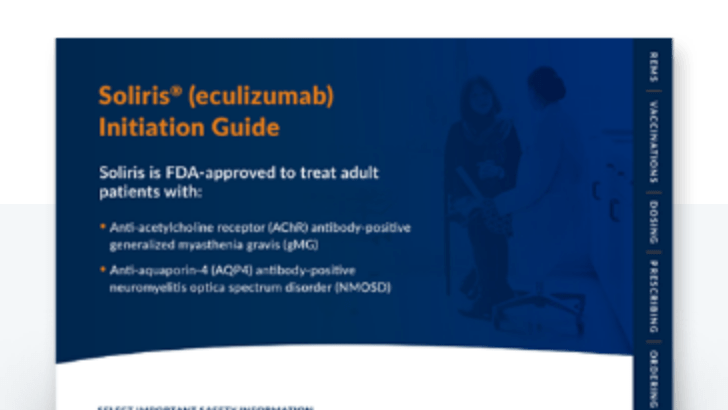
Dosing and Administration
A quick guide for you and your staff to help in prescribing, dosing, and administering SOLIRIS.
DownloadFor your patients
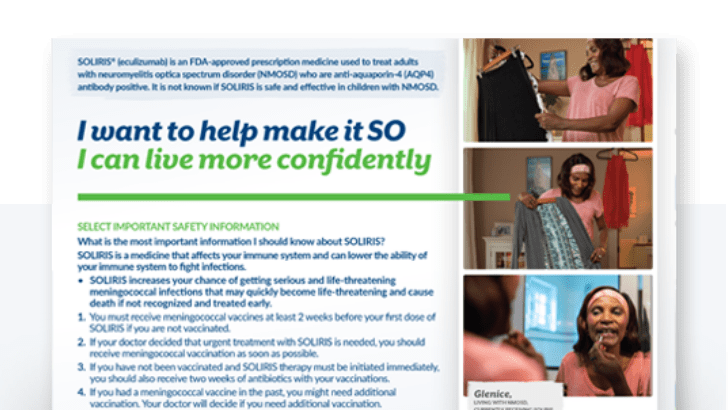
SOLIRIS Patient Brochure
Educate patients on anti-AQP4 antibody-positive NMOSD, their risk of relapse, and how SOLIRIS may help.
Download
CoPay Brochure
Find details about the Alexion OneSource™ CoPay Program, which may help patients pay for eligible out-of-pocket medication and infusion costs.
DownloadVisit the Alexion Access Navigator website for more helpful resources.
AlexionAccessNavigator.com


WARNING: SERIOUS MENINGOCOCCAL INFECTIONS
SOLIRIS, a complement inhibitor, increases the risk of serious infections caused by Neisseria meningitidis [see Warnings and Precautions (5.1)]. Life-threatening and fatal meningococcal infections have occurred in patients treated with complement inhibitors. These infections may become rapidly life-threatening or fatal if not recognized and treated early.
- Complete or update vaccination for meningococcal bacteria (for serogroups A, C, W, Y, and B) at least 2 weeks prior to the first dose of SOLIRIS, unless the risks of delaying SOLIRIS therapy outweigh the risk of developing a serious infection. Comply with the most current Advisory Committee on Immunization Practices (ACIP) recommendations for vaccinations against meningococcal bacteria in patients receiving a complement inhibitor. See Warnings and Precautions (5.1) for additional guidance on the management of the risk of serious infections caused by meningococcal bacteria.
- Patients receiving SOLIRIS are at increased risk for invasive disease caused by Neisseria meningitidis, even if they develop antibodies following vaccination. Monitor patients for early signs and symptoms of serious meningococcal infections and evaluate immediately if infection is suspected.
Because of the risk of serious meningococcal infections, SOLIRIS is available only through a restricted program under a Risk Evaluation and Mitigation Strategy (REMS) called ULTOMIRIS and SOLIRIS REMS [see Warnings and Precautions (5.2)].
CONTRAINDICATIONS
- SOLIRIS is contraindicated for initiation in patients with unresolved serious Neisseria meningitidis infection.
WARNINGS AND PRECAUTIONS
Serious Meningococcal Infections
SOLIRIS, a complement inhibitor, increases a patient’s susceptibility to serious, life-threatening, or fatal infections caused by meningococcal bacteria (septicemia and/or meningitis) in any serogroup, including non-groupable strains. Life-threatening and fatal meningococcal infections have occurred in both vaccinated and unvaccinated patients treated with complement inhibitors.
Revaccinate patients in accordance with ACIP recommendations considering the duration of therapy with SOLIRIS. Note that ACIP recommends an administration schedule in patients receiving complement inhibitors that differs from the administration schedule in the vaccine prescribing information.
If urgent SOLIRIS therapy is indicated in a patient who is not up to date with meningococcal vaccines according to ACIP recommendations, provide the patient with antibacterial drug prophylaxis and administer meningococcal vaccines as soon as possible. Various durations and regimens of antibacterial drug prophylaxis have been considered, but the optimal durations and drug regimens for prophylaxis and their efficacy have not been studied in unvaccinated or vaccinated patients receiving complement inhibitors, including SOLIRIS. The benefits and risks of treatment with SOLIRIS, as well as those associated with antibacterial drug prophylaxis in unvaccinated or vaccinated patients, must be considered against the known risks for serious infections caused by Neisseria meningitidis.
Vaccination does not eliminate the risk of serious meningococcal infections, despite development of antibodies following vaccination.
Closely monitor patients for early signs and symptoms of meningococcal infection and evaluate patients immediately if infection is suspected. Inform patients of these signs and symptoms and instruct patients to seek immediate medical care if these signs and symptoms occur. Promptly treat known infections. Meningococcal infection may become rapidly life-threatening or fatal if not recognized and treated early. Consider interruption of SOLIRIS in patients who are undergoing treatment for serious meningococcal infection, depending on the risks of interrupting treatment in the disease being treated.
ULTOMIRIS and SOLIRIS REMS
Due to the risk of serious meningococcal infections, SOLIRIS is available only through a restricted program called ULTOMIRIS and SOLIRIS REMS.
Prescribers must enroll in the REMS, counsel patients about the risk of serious meningococcal infection, provide patients with REMS educational materials, assess patient vaccination status for meningococcal vaccines (against serogroups A, C, W, Y, and B) and vaccinate if needed according to current ACIP recommendations two weeks prior to the first dose of SOLIRIS. Antibacterial drug prophylaxis must be prescribed if treatment must be started urgently and the patient is not up to date with both meningococcal vaccines according to current ACIP recommendations at least two weeks prior to the first dose of SOLIRIS. Patients must receive counseling about the need to receive meningococcal vaccines and to take antibiotics as directed, the signs and symptoms of meningococcal infection, and be instructed to carry the Patient Safety Card with them at all times during and for 3 months following SOLIRIS treatment.
Further information is available at www.UltSolREMS.com or 1-888-765-4747.
Other Infections
Serious infections with Neisseria species (other than Neisseria meningitidis), including disseminated gonococcal infections, have been reported.
SOLIRIS blocks terminal complement activation; therefore, patients may have increased susceptibility to infections, especially with encapsulated bacteria, such as infections with Neisseria meningitidis but also Streptococcus pneumoniae, Haemophilus influenzae, and to a lesser extent, Neisseria gonorrhoeae. Additionally, Aspergillus infections have occurred in immunocompromised and neutropenic patients. Patients receiving SOLIRIS are at increased risk for infections due to these organisms, even if they develop antibodies following vaccination.
Thrombosis Prevention and Management
The effect of withdrawal of anticoagulant therapy during SOLIRIS treatment has not been established. Therefore, treatment with SOLIRIS should not alter anticoagulant management.
Infusion-Related Reactions
Administration of SOLIRIS may result in infusion-related reactions, including anaphylaxis or other hypersensitivity reactions. In clinical trials, no patients experienced an infusion-related reaction which required discontinuation of SOLIRIS. Interrupt SOLIRIS infusion and institute appropriate supportive measures if signs of cardiovascular instability or respiratory compromise occur.
ADVERSE REACTIONS
The most frequently reported adverse reactions in the NMOSD placebo-controlled trial (≥10%) were: upper respiratory infection, nasopharyngitis, diarrhea, back pain, dizziness, influenza, arthralgia, pharyngitis, and contusion.
To report SUSPECTED ADVERSE REACTIONS contact Alexion Pharmaceuticals, Inc. at 1-844-259-6783 or FDA at 1-800-FDA-1088 or www.fda.gov/medwatch.
INDICATION
SOLIRIS is indicated for the treatment of neuromyelitis optica spectrum disorder (NMOSD) in adult patients who are anti-aquaporin-4 (AQP4) antibody positive.
Please see full Prescribing Information for SOLIRIS, including Boxed WARNING regarding serious and life-threatening or fatal meningococcal infections.
WARNING: SERIOUS MENINGOCOCCAL INFECTIONS
SOLIRIS, a complement inhibitor, increases the risk of serious infections caused by Neisseria meningitidis [see Warnings and Precautions (5.1)]. Life-threatening and fatal meningococcal infections have occurred in patients treated with complement inhibitors. These infections may become rapidly life-threatening or fatal if not recognized and treated early.
- Complete or update vaccination for meningococcal bacteria (for serogroups A, C, W, Y, and B) at least 2 weeks prior to the first dose of SOLIRIS, unless the risks of delaying SOLIRIS therapy outweigh the risk of developing a serious infection. Comply with the most current Advisory Committee on Immunization Practices (ACIP) recommendations for vaccinations against meningococcal bacteria in patients receiving a complement inhibitor. See Warnings and Precautions (5.1) for additional guidance on the management of the risk of serious infections caused by meningococcal bacteria.
- Patients receiving SOLIRIS are at increased risk for invasive disease caused by Neisseria meningitidis, even if they develop antibodies following vaccination. Monitor patients for early signs and symptoms of serious meningococcal infections and evaluate immediately if infection is suspected.
Because of the risk of serious meningococcal infections, SOLIRIS is available only through a restricted program under a Risk Evaluation and Mitigation Strategy (REMS) called ULTOMIRIS and SOLIRIS REMS [see Warnings and Precautions (5.2)].
CONTRAINDICATIONS
- SOLIRIS is contraindicated for initiation in patients with unresolved serious Neisseria meningitidis infection.
WARNINGS AND PRECAUTIONS
Serious Meningococcal Infections
SOLIRIS, a complement inhibitor, increases a patient’s susceptibility to serious, life-threatening, or fatal infections caused by meningococcal bacteria (septicemia and/or meningitis) in any serogroup, including non-groupable strains. Life-threatening and fatal meningococcal infections have occurred in both vaccinated and unvaccinated patients treated with complement inhibitors.
Revaccinate patients in accordance with ACIP recommendations considering the duration of therapy with SOLIRIS. Note that ACIP recommends an administration schedule in patients receiving complement inhibitors that differs from the administration schedule in the vaccine prescribing information.
If urgent SOLIRIS therapy is indicated in a patient who is not up to date with meningococcal vaccines according to ACIP recommendations, provide the patient with antibacterial drug prophylaxis and administer meningococcal vaccines as soon as possible. Various durations and regimens of antibacterial drug prophylaxis have been considered, but the optimal durations and drug regimens for prophylaxis and their efficacy have not been studied in unvaccinated or vaccinated patients receiving complement inhibitors, including SOLIRIS. The benefits and risks of treatment with SOLIRIS, as well as those associated with antibacterial drug prophylaxis in unvaccinated or vaccinated patients, must be considered against the known risks for serious infections caused by Neisseria meningitidis.
Vaccination does not eliminate the risk of serious meningococcal infections, despite development of antibodies following vaccination.
Closely monitor patients for early signs and symptoms of meningococcal infection and evaluate patients immediately if infection is suspected. Inform patients of these signs and symptoms and instruct patients to seek immediate medical care if these signs and symptoms occur. Promptly treat known infections. Meningococcal infection may become rapidly life-threatening or fatal if not recognized and treated early. Consider interruption of SOLIRIS in patients who are undergoing treatment for serious meningococcal infection, depending on the risks of interrupting treatment in the disease being treated.
ULTOMIRIS and SOLIRIS REMS
Due to the risk of serious meningococcal infections, SOLIRIS is available only through a restricted program called ULTOMIRIS and SOLIRIS REMS.
Prescribers must enroll in the REMS, counsel patients about the risk of serious meningococcal infection, provide patients with REMS educational materials, assess patient vaccination status for meningococcal vaccines (against serogroups A, C, W, Y, and B) and vaccinate if needed according to current ACIP recommendations two weeks prior to the first dose of SOLIRIS. Antibacterial drug prophylaxis must be prescribed if treatment must be started urgently and the patient is not up to date with both meningococcal vaccines according to current ACIP recommendations at least two weeks prior to the first dose of SOLIRIS. Patients must receive counseling about the need to receive meningococcal vaccines and to take antibiotics as directed, the signs and symptoms of meningococcal infection, and be instructed to carry the Patient Safety Card with them at all times during and for 3 months following SOLIRIS treatment.
Further information is available at www.UltSolREMS.com or 1-888-765-4747.
Other Infections
Serious infections with Neisseria species (other than Neisseria meningitidis), including disseminated gonococcal infections, have been reported.
SOLIRIS blocks terminal complement activation; therefore, patients may have increased susceptibility to infections, especially with encapsulated bacteria, such as infections with Neisseria meningitidis but also Streptococcus pneumoniae, Haemophilus influenzae, and to a lesser extent, Neisseria gonorrhoeae. Additionally, Aspergillus infections have occurred in immunocompromised and neutropenic patients. Patients receiving SOLIRIS are at increased risk for infections due to these organisms, even if they develop antibodies following vaccination.
Thrombosis Prevention and Management
The effect of withdrawal of anticoagulant therapy during SOLIRIS treatment has not been established. Therefore, treatment with SOLIRIS should not alter anticoagulant management.
Infusion-Related Reactions
Administration of SOLIRIS may result in infusion-related reactions, including anaphylaxis or other hypersensitivity reactions. In clinical trials, no patients experienced an infusion-related reaction which required discontinuation of SOLIRIS. Interrupt SOLIRIS infusion and institute appropriate supportive measures if signs of cardiovascular instability or respiratory compromise occur.
ADVERSE REACTIONS
The most frequently reported adverse reactions in the NMOSD placebo-controlled trial (≥10%) were: upper respiratory infection, nasopharyngitis, diarrhea, back pain, dizziness, influenza, arthralgia, pharyngitis, and contusion.
To report SUSPECTED ADVERSE REACTIONS contact Alexion Pharmaceuticals, Inc. at 1-844-259-6783 or FDA at 1-800-FDA-1088 or www.fda.gov/medwatch.
INDICATION
SOLIRIS is indicated for the treatment of neuromyelitis optica spectrum disorder (NMOSD) in adult patients who are anti-aquaporin-4 (AQP4) antibody positive.
Please see full Prescribing Information for SOLIRIS, including Boxed WARNING regarding serious and life-threatening or fatal meningococcal infections.